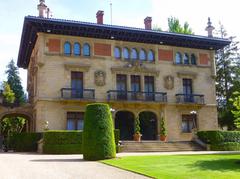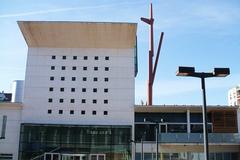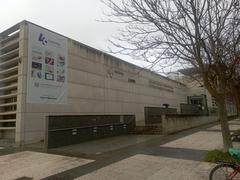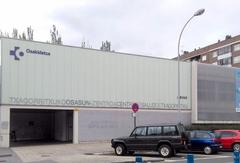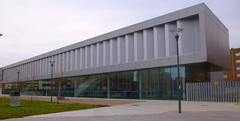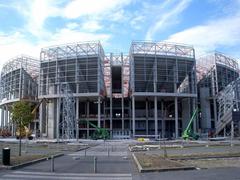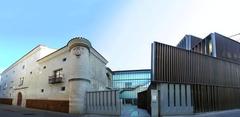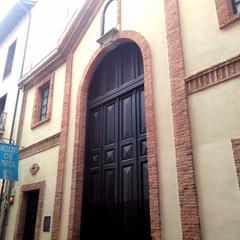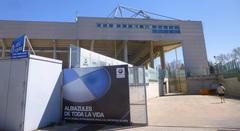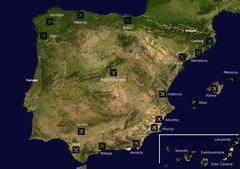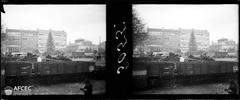Casa El Portalón Vitoria-Gasteiz, Spain: Visiting Hours, Tickets, and Historical Site Guide
Date: 03/07/2025
Introduction: History and Cultural Significance
Casa El Portalón, located in the medieval quarter of Vitoria-Gasteiz, stands as a remarkable emblem of the city’s mercantile past and architectural heritage. Originating in the 15th century, it was constructed as an inn for merchants and travelers, strategically placed along trade routes connecting Castile with northern Europe. Its robust late Gothic architecture—marked by thick stone walls, pointed arches, and a grand oak entrance—offers a tangible link to the bustling commercial life of medieval Vitoria-Gasteiz. Over the centuries, Renaissance enhancements added larger windows and decorative balconies, blending utility with elegance. Today, Casa El Portalón functions as a renowned restaurant, allowing guests to savor traditional Basque cuisine in a setting steeped in history. Its proximity to landmarks such as the Cathedral of Santa María and the Torre de los Anda makes it a cornerstone of the Casco Viejo, the city’s protected medieval core. This guide delves into the site’s historical importance, architectural evolution, visitor information, and tips for maximizing your experience at this iconic Basque landmark (Euskatur, Restaurante El Portalón, Gasteiz Hoy).
Table of Contents
- Introduction
- Medieval Origins and Historical Context
- Architectural Features and Evolution
- Cultural and Historical Significance
- Practical Visitor Information
- Nearby Attractions and Travel Tips
- Frequently Asked Questions (FAQ)
- Conclusion and Call to Action
- References
Medieval Origins and Historical Context
Casa El Portalón reflects the rise of Vitoria-Gasteiz as a prominent commercial hub from the 12th century onwards. Originally built as a merchants’ inn in the 15th century, it provided lodging, storage, and trading facilities for itinerant traders. Its prime location near city gates and main thoroughfares facilitated commerce and safeguarded travelers’ goods (Euskatur).
Architectural Features and Evolution
Gothic Foundations
The building exemplifies late Gothic civil architecture in the Basque Country. Key features include:
- Imposing Stone Construction: Thick walls and fortress-like solidity.
- Pointed Arches: Especially the main entrance, known as “El Portalón,” designed to accommodate carts and merchants’ goods.
- Small, Irregular Windows: Provided security and surveillance.
- Timber-Framed Upper Floors: Overhanging eaves and galleries typical of Basque urban houses (Euskatur).
Renaissance Adaptations
In later centuries, Renaissance influences introduced:
- Larger Windows and Balconies: Enhancing comfort and aesthetics.
- Interior Modifications: Adapted for both residential and commercial purposes, while retaining medieval features like wooden beams and vaulted ceilings.
Modern Restoration and Current Use
A significant restoration in the 20th century stabilized the building and preserved its historic elements. Modern interventions were undertaken with sensitivity to heritage conservation. Today, Casa El Portalón operates as a highly regarded restaurant, maintaining its role as a vibrant social and cultural venue (Wanderlog).
Cultural and Historical Significance
Casa El Portalón is not only a rare specimen of late Gothic civil architecture but also a symbol of Vitoria-Gasteiz’s urban development. Its ongoing use as a restaurant keeps it intertwined with local life, merging preservation with vibrancy. The building is part of the Casco Viejo’s protected monumental ensemble, surrounded by historic landmarks that enrich its context (Euskatur).
Practical Visitor Information
Location and Accessibility
- Address: Calle Correría 151 (Hedegile Kalea 151), adjacent to Plaza de las Burullerías.
- Getting There: The medieval quarter is pedestrian-friendly, accessible by foot, bike, tram, or public transport. Nearest parking: Parking Aldabe, 46 meters away (LaCarte.Menu), though parking in the old town is limited (CocoTran).
Visiting Hours and Tickets
- Restaurant Hours (subject to change):
- Monday to Friday: 13:00–15:30, 20:30–22:45
- Saturday: 13:00–15:30, 21:00–23:00
- Sunday: 13:00–15:30 (Tourism Euskadi, PridePoint)
- Entrance Fee: No separate ticket required; access is through dining reservations.
- Reservations: Strongly recommended, especially on weekends and holidays. Book via phone (+34 945 14 27 55) or the official website.
Dining Experience
- Cuisine: Traditional Basque dishes such as txangurro, chuletón, and local mushrooms, with a focus on regional ingredients (Minube).
- Menu Options: À la carte, tasting menus, and a comprehensive Rioja Alavesa wine list.
- Prices: €30–€70 per person, depending on menu selection (LaCarte.Menu).
Accessibility
- Mobility: Street-level entrance, but interior stairs and no elevator may restrict access to upper floors (PridePoint).
- Restrooms: Modern facilities on the main floor.
- Child-friendliness: Welcoming to children, best suited for families with older children.
Guided Tours and Special Events
- Guided Tours: Not offered by the site itself but often included in city walking tours.
- Special Events: Occasional cultural events, wine tastings, and themed dinners. Check the restaurant’s website or local tourism portals for updates (Restaurante El Portalón).
Photography and Visuals
- Photography: Allowed inside (ask staff for permission); best light for exterior photos is early morning or late afternoon.
- Suggested images: “Casa El Portalón medieval façade,” “Casa El Portalón interior dining room,” and maps of the Casco Viejo.
Nearby Attractions and Travel Tips
Explore these historical sites within walking distance:
- Cathedral of Santa María: UNESCO-listed, offering guided tours and panoramic views (Spain.info).
- Torre de los Anda: Medieval tower adjacent to Casa El Portalón.
- Plaza de las Burullerías: Vibrant historic square.
- Old Town Highlights: Museums, artisan shops, and pintxos bars (CocoTran).
Travel Tips:
- Reserve your table in advance.
- Allow extra time for navigating the narrow streets.
- Pair your meal with a visit to nearby sites.
- Try signature Basque specialties like txangurro and Basque cheesecake.
- Staff speak Spanish and often English; menus are multilingual.
Frequently Asked Questions (FAQ)
Q: What are Casa El Portalón’s visiting hours?
A: Monday–Friday: 13:00–15:30, 20:30–22:45; Saturday: 13:00–15:30, 21:00–23:00; Sunday: 13:00–15:30.
Q: Is there an entrance fee or ticket?
A: No entrance fee; reservations are required for dining.
Q: Are guided tours available?
A: Not directly, but included in some city tours.
Q: Is Casa El Portalón accessible for visitors with reduced mobility?
A: The ground floor is accessible, but stairs limit access to upper levels.
Q: Can I take photos inside?
A: Yes, but it’s courteous to ask staff for permission.
Conclusion and Call to Action
Casa El Portalón stands as a living testament to Vitoria-Gasteiz’s medieval heritage, offering an immersive blend of architectural splendor and Basque culinary tradition. Its well-preserved Gothic structure, rich history, and vibrant role as a restaurant make it a must-visit destination for history lovers, architecture enthusiasts, and food connoisseurs. To ensure a seamless experience, check current hours, make reservations in advance, and enrich your visit by exploring nearby sites in the Casco Viejo. For a deeper dive into Vitoria-Gasteiz’s history, download the Audiala app for guided tours and stay connected via social media for updates on events and travel tips.
References
- Euskatur – Vitoria-Gasteiz Historical Places
- Restaurante El Portalón – Official Site
- Gasteiz Hoy – Rincones Casco Medieval Vitoria
- Wanderlog – El Portalón Restaurant
- Minube – Restaurante El Portalón
- Tourism Euskadi – El Portalón Restaurant
- PridePoint – Restaurante El Portalón Vitoria
- Spain.info – Vitoria-Gasteiz
- LaCarte.Menu – El Portalón
- CocoTran – Vitoria-Gasteiz
- Euskadi.eus – El Portalón
- Guide du Pays Basque – El Portalón
- Vitruvio Arte – El Portalón
